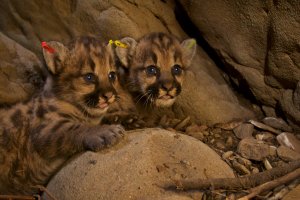Two new litters of mountain lion kittens, both with the same male suspected to be the father, were discovered by researchers in the eastern Santa Susana Mountains.

The five kittens — two females in one litter, and two males and another female in the other — have been ear-tagged, the Santa Monica Mountains National Recreation Area announced Wednesday.
The National Park Service released photos and video of the tiny, blue-eyed new kittens.
The two litters — the 10th and 11th found by federal biologists at a den site — were found in June by GPS locations from the two mothers’ radio collars.
The mother of the two-kitten litter, P-35, has been tracked since April 2014. She’s about 6 years old, and scientists believe her earlier offspring, P-44, did not survive. Her new kittens have been dubbed P-48 and P-49.
The second mother, P-39, is about 5 years old and had been tracked since April 2015. Her den was found in a cave-like area, a National Park Service news release said. Her kittens are P-50 and P-52, the males, and P-51, the female.

The father is believed to be P-38 because of his own GPS locations, which show he spent multiple days with both mothers before the two litters were born.
Genetic samples are being tested to determine paternity for certain, the park service said.
The park service has been studying mountain lions since 2002, and they appear to be reproducing successfully despite challenges, federal biologist Jeff Sikich said.
“The real challenge comes as these kittens grow older and disperse, especially the males, and have to deal with threats from other mountain lions and also road mortality and the possibility of poisoning from anticoagulant rodenticide,” he said in the release.




